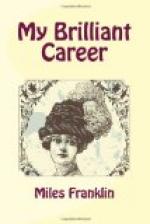“Then all I can say is that I haven’t much respect for you, Miss Melvyn. I always considered that there were three classes of women—one, that would marry a blackfellow if he had money; another, that were shameless flirts, and who amuse themselves by flirting and disgracing the name of woman; and a third class that were pure and true, on whom a man could stake his life and whom he could worship. I thought you belonged to this class, but I have been mistaken. I know you always try to appear heartless and worthless, but I fancied it was only your youth and mischief, and imagined you were good underneath; but I have been mistaken,” he repeated with quiet contempt.
His face had regained its natural colour, and the well-cut pleasant mouth, clearly seen beneath the soft drooping moustache, had hardened into a sullen line which told me he would never be first to seek reconciliation—not even to save his life.
“Bah!” I exclaimed sarcastically. “It appears that we all labour under delusions. Go and get a beautiful woman to wear your ring and your name. One that will be able to say yes and no at the right time; one who will know how to dress properly; one who wouldn’t for the world do anything that other women did not also; one who will know where to buy the best groceries and who will readily sell herself to you for your wealth. That’s the sort of woman that suits men, and there are plenty of them; procure one, and don’t bother with me. I am too small and silly, and have nothing to recommend me. I fear it speaks little for your sense or taste that you ever thought of me. Ta-ta, Mr Beecham,” I said over my shoulder with a mocking smile, and walked away.
When about half-way down the orchard reflection pulled me up shortly under an apple-tree.
I had said what I had said because, feeling bitter for the want of love, and because full of pain myself, I rejoiced with a sort of revenge to see the same feeling flash across another’s face. But now I was cool, and, forgetting myself, thought of Harold.
I had led him on because his perpetually calm demeanour had excited in me a desire to test if it were possible to disturb him. I had thought him incapable of emotion, but he had proved himself a man of strong and deep emotion; might he not also be capable of feeling—of love? He had not been mean or nasty in his rage, and his anger had been righteous. By accepting his proposal of marriage, I had given him the right of expressing his objection to any of my actions of which he disapproved. I on my part had the liberty of trying to please him or of dissolving our engagement. Perhaps in some cases there was actually something more than wounded vanity when a man’s alleged love was rejected or spurned. Harold had seemed to suffer, to really experience keen disappointment. I was clearly in the wrong, and had been unwomanly beyond a doubt, as, granting that Harold Beecham was conceited, what right had




